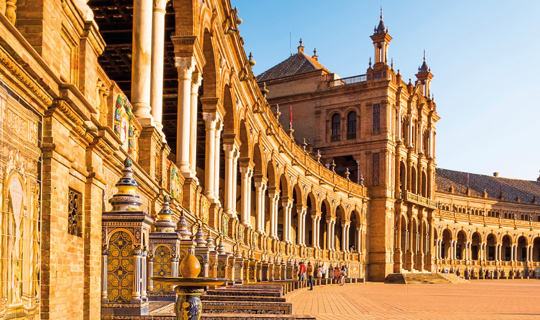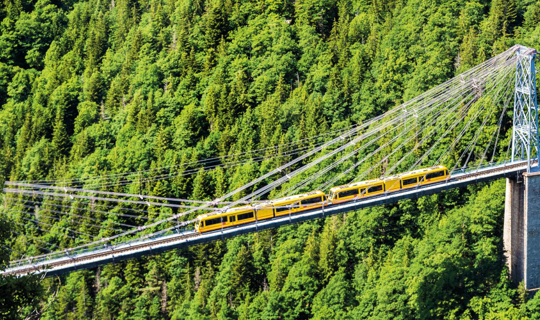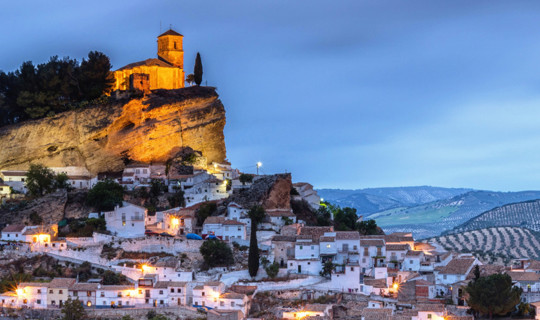30 Spain Facts You Didn’t Know
Spain, a superb blend of sun, delicious food, and fascinating history, comprises most of Europe's Iberian Peninsula. It has enduring appeal for travellers with its remarkable fusion of geography, music, distinctive traditions, and rich heritage. As you embark on a journey through this varied land, you'll find yourself captivated by its compelling mix of tradition and contemporary style. To unravel the many layers of Spain, let's examine 30 Spain facts that illuminate the country's soul and the diverse range of experiences it has to offer.
30 Interesting & Fun Facts about Spain
Encompassing the spirited passion of flamenco, delicious wine and sherry, and the work of incredible artists like Gaudí and Picasso, Spain has a vibrant culture with so much to see and do. From museums to monasteries, castles and mountains, there are majestic sights and discoveries around every corner.
1. Spain is a huge olive oil producer
Spain is one of the world's leading producers of olive oil, contributing nearly 45% of global production. It is responsible for more than double the quantity that Italy produces, and in Andalucia alone more than 300 million olives are harvested annually.
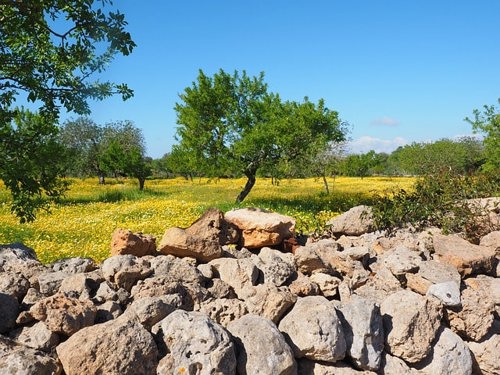
2. Spain has prestige in wine production
Spain, one of the world's top wine producers, is home to a multitude of vineyards that attract wine lovers from all over the globe. From the famous Rioja to the delightful Cava, each region in Spain showcases its own unique grape varieties in distinct and sought-after wines.
3. Spain has a high density of bars and restaurants
Spain is known for its abundant bars and restaurants, boasting the highest number per capita in the world. In an average Spanish town, you’ll find locals happily enjoying a cup of coffee or tapas paired with their favourite summer wine, tinto de verano, which is a bit like sangria. With approximately 260,000 bars throughout the country, you’ll always find somewhere to stop for refreshments.
4. Spain offers plenty of UNESCO World Heritage Sites
Spain's cultural wealth is showcased in its UNESCO-designated sites, which include famous landmarks like the Alhambra Palace in Granada and the historic centre of Cordoba. These treasures provide invaluable glimpses into Spain's rich heritage, and Spain is third in the world, after Italy and China, for UNESCO sites.
Walk the grand halls, stunning courtyards and Generalife Gardens of Alhambra Palace as you spend a Week in Andalucia.
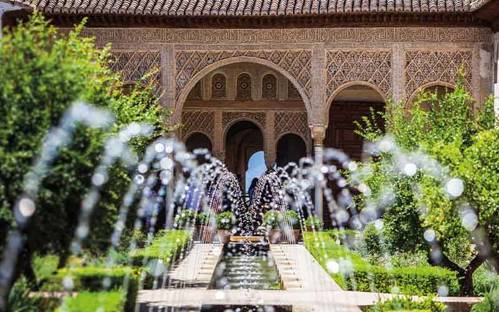
5. Spanish naming tradition uses two surnames
In Spain, it is a common tradition for individuals to have two surnames. The first surname is passed down from the father, and the second surname comes from the mother. Both surnames are used in legal documentation.
6. Spain loves siestas
In Spanish culture, the tradition of warm afternoon siestas is deeply cherished. These are short naps that can range from 20 minutes to 2 hours in duration. To honour this cultural practice, many establishments temporarily close their doors in the early afternoon and reopen later in the day.
7. The Moors conquered almost half of Spain in the 8th century
A major turning point in the history of Spain occurred in the 8th century when the Moors, composed of North African descendants and Arab Berbers, arrived on the Iberian Peninsula. By 711 AD, they had conquered more than half of the country.
8. Arabic language had an influence on Spanish
The history of Spain has had a profound influence on its language. With the Moorish invasion mentioned above, there was a great deal of cultural sharing. This cultural exchange led to an intriguing integration of Arab culture and language in Spain.
9. Spain was neutral in both world wars
Spain managed to remain neutral during the First World War (1914-1918) and the Second World War (1939-1945). King Alfonso XIII effectively balanced internal pressures during the First World War, while the Spanish Civil War from 1936 to 1939 prevented Spain's involvement in the Second World War.
10. La Sagrada Família basilica is still in progress
In Barcelona, the ongoing construction of La Sagrada Família, a breathtaking basilica designed by celebrated architect Antoni Gaudí, has been captivating visitors for generations. This iconic masterpiece has been in progress since 1882.
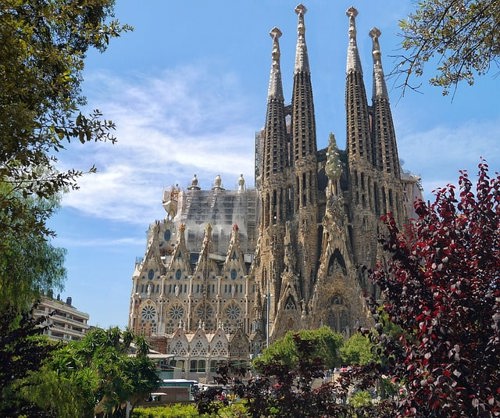
11. Spain has a passion for lottery games
One distinctive aspect of Spanish culture is its deep love for lottery games. The big El Gordo (fat one) lottery, in particular, captures international interest. It is especially popular during Christmas time and features local children announcing the winning numbers and significant prizes up for grabs.
12. Spain has the world's oldest operating restaurant
In Madrid, there is a renowned restaurant called Sobrino de Botín, which has been in operation since 1725 and is believed to be the world's oldest continuously operating restaurant. This distinguished establishment offers authentic Spanish cuisine.
Best Selling Spain Tour
-
![]()
A Week in Andalucia
This relaxing holiday gives you the chance to unwind and soak up the sun whilst discovering the best of Andalucía.
- Return flights
- 7 nights in a 4-star hotel
- 15 meals: 7 breakfasts, 1 lunch and 7 dinners
Explore8 days from£1,199 -
![pspyr]()
Little Trains of the Pyrenees
Take unforgettable scenic journeys by train through the Pyrenees to discover breath-taking mountain vistas and charming villages.
- Return flights
- 7 nights half-board in a 3-star hotel
- 7 breakfasts, 7 dinners and welcome drink
Explore8 days from£1,324 -
![]()
A Week in Andalucia at Christmas
This relaxing holiday gives you the chance to unwind and soak up the sun whilst discovering the best of Andalucía.
- Return flights
- 7 nights in a 4-star hotel
- 15 meals: 7 breakfasts, 1 lunch and 7 dinners including a Festive Gala Dinner on Christmas Day
Explore8 days from£1,599
13. Bull running is one of Spain’s adrenaline-filled traditions
Every year, Pamplona hosts the renowned San Fermín festival, which is known for its thrilling and risky "Running of the Bulls" event. Adventure-seekers and spectators from all corners of the globe gather to witness brave participants sprint ahead of powerful bulls through the city's narrow streets.
14. Spain has multiple languages
While the language spoken in Spain is commonly referred to as Spanish, its official name is Castilian, or Castellano. However, Spain also has co-official regional languages like Catalan, or Català, Galician, Galego, and Basque or Euskara.
15. Most people live in apartments
Detached family houses are not commonly found in Spain, as most people live in apartments or flats. This architectural phenomenon is noticeable when exploring Spanish cities.
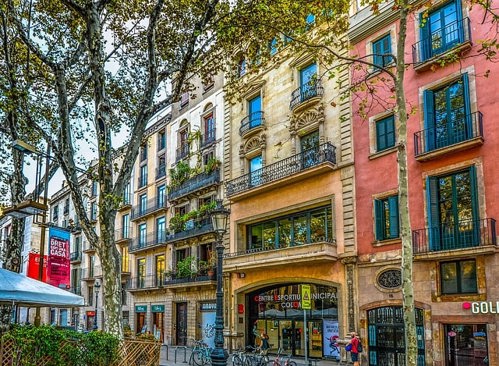
16. The Spanish Inquisition lasted three centuries
The Spanish Inquisition, which began in the late 15th century under Roman Catholic monarchs Ferdinand II and Isabella I, lasted for over three centuries until 1834. Its main objective was to establish religious conformity by targeting Jews and Muslims for conversion to Christianity.
17. 1936 saw the Spanish Civil War
In 1936, the Spanish Civil War began, creating a brutal conflict that tore the nation apart. The war pitted left-leaning Republicans against right-wing Nationalists, with General Francisco Franco leading the latter to victory.
18. One of Spain’s languages is the oldest in Europe
Approximately 750,000 people in specific northeastern areas of Spain speak the Basque language, also known as Euskara. Experts consider it to be potentially the oldest living language in Europe.
19. Sevilla's La Feria de Abril is the oldest fiesta in the world
Sevilla is home to the oldest fiesta in the world, known as La Feria de Abril, which has been celebrated for over 170 years since its inception in 1847. The fairgrounds come alive with a dazzling display of beautifully adorned tents called casetas, adding to the vibrant atmosphere of this remarkable event.
20. One unforgettable festival is the La Tomatina tomato fight
La Tomatina is a special event in Spain's festival culture. It began as an impromptu tomato fight during a parade in Buñol in 1945 and has since become a beloved annual tradition that draws enthusiastic participants from around the world to pelt each other with tomatoes.
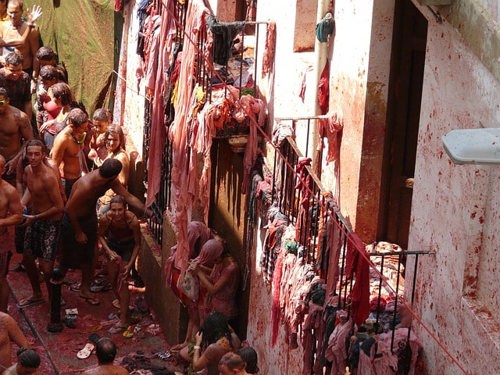
21. The Canary Islands have distinct microclimates
The Canary Islands, which are part of Spain's autonomous community, have a fascinating characteristic: they host distinct microclimates. Each of the seven main islands has its own unique weather patterns and ecosystems, resulting in diverse landscapes that range from lush forests to arid deserts.
22. Spain has many mountains
Spain is the second most mountainous country in Europe, behind Switzerland. Beautiful Spanish mountain ranges include the Pyrenees and Sierra Nevada.
Take an unforgettable journey through the Pyrenees by train and experience this famed mountain range dividing France and Spain.
23. A wine fountain tradition in northern Spain
For wine enthusiasts travelling along the Santiago de Compostela pilgrimage route in northern Spain, there is a special treat. At Bodega Irache Winery, visitors can experience something truly unique – a free wine fountain. This tradition has been around since 1891 and allows pilgrims to enjoy sips of wine throughout their journey.
24. There’s a town where 700 people share the surname Japón
In the valley region of Sevilla, you'll find a charming town called Coria del Río. What makes this town truly remarkable is that around 700 residents share the surname of Japón. This distinctive tradition can be traced back to Hasekura Tsunenaga, a Samurai who ventured to Spain in the early 17th century.
25. Coca-Cola has possible Spanish origins
While Coca-Cola is commonly associated with American culture, it actually has an intriguing link to Spain. According to legend, Juan Muntane Carbonell devised a drink called Kola-Coca in 1885, which was two years prior to the official establishment of Coca-Cola.
26. Spain is the birthplace of flamenco
Flamenco is an enchanting art form that originated in Spain and encompasses guitar music, powerful singing, expressive dancing, and rhythmic handclaps with castanets. It holds a special place in the hearts of the Spanish, particularly in the south.
27. Spain is very artistic
When it comes to the world of art, Spain has contributed many masterpieces from artists as diverse as Picasso, Dali, and Miro. The Prado, Spain’s national art museum in Madrid, is home to spectacular collections of paintings by Goya and Velasquez, along with Flemish and Italian art.
28. Spain boats a long life expectancy
Spain has one of the highest life expectancies in the world, with an average lifespan of roughly 83 years. This can be attributed to the amount of fresh fruit and vegetables in the typical diet, as well as good healthcare.
29. Spain's national dish is paella
This globally-loved dish originated in Spain, but there are lots of recipes that people use. True paella only needs to have rice and spices. Beyond that, people may add chicken, seafood, or vegetables to create many variations.
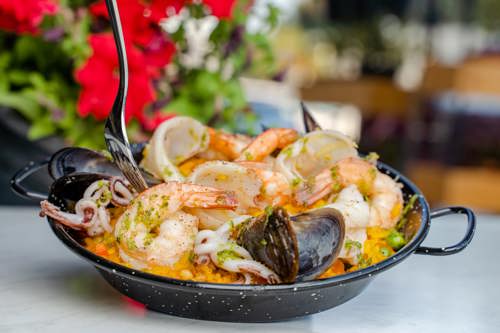
30. It’s traditional to eat 12 grapes for good luck
Spain adds sweetness to its New Year's Eve countdown with a unique custom. As the clock strikes midnight, individuals in Spain consume 12 grapes, one for each chime, in the hope of attracting good luck for the upcoming year.
Explore Spain with Travelsphere
Spain is an excellent destination for travellers, offering an enormous range of opportunities to explore intriguing history and vibrant culture. With Travelsphere's exclusive escorted tours to Spain, you can immerse yourself in the wonders of this captivating country. These tours aim to go beyond typical tourist spots, allowing you to uncover the essence of Spain’s rich heritage while connecting with like-minded explorers. Try our Week in Andalucia Tour to see the majesty of Alhambra Palace, Seville, and the beautiful coastline. Or, try our Little Trains of the Pyrenees Tour to have an unforgettable journey including enjoying iconic railways and gorgeous sights, all while sampling authentic Spanish food and drink.
Our carefully curated itineraries, knowledgeable tour managers, and exquisite accommodations are all tailored to ensure an exceptional and authentic travel experience. Whether you're strolling through atmospheric cobble streets, savouring a delicious regional speciality, or enjoying the country’s incredible beauty, Spain offers a welcoming and enriching journey that guarantees unforgettable memories.
Other articles you may like
-
5 Reasons to Visit Spain
An ever-popular choice amongst British sun-seekers, Spain is a magnificent country of intoxicating variety, culture and contrasts. -
5 Reasons to take an escorted tour
Penny Smith has travelled with us to Italy, Croatia, India and South Africa - here she gives us 5 reasons why everyone should consider a guided holiday -
Top Destinations for 2024
We have listed our top destinations to visit in 2024. From iconic cities in Italy to awe-inspiring sights in Brazil and a fascinating heritage in Vietnam – there’s something for everyone.



